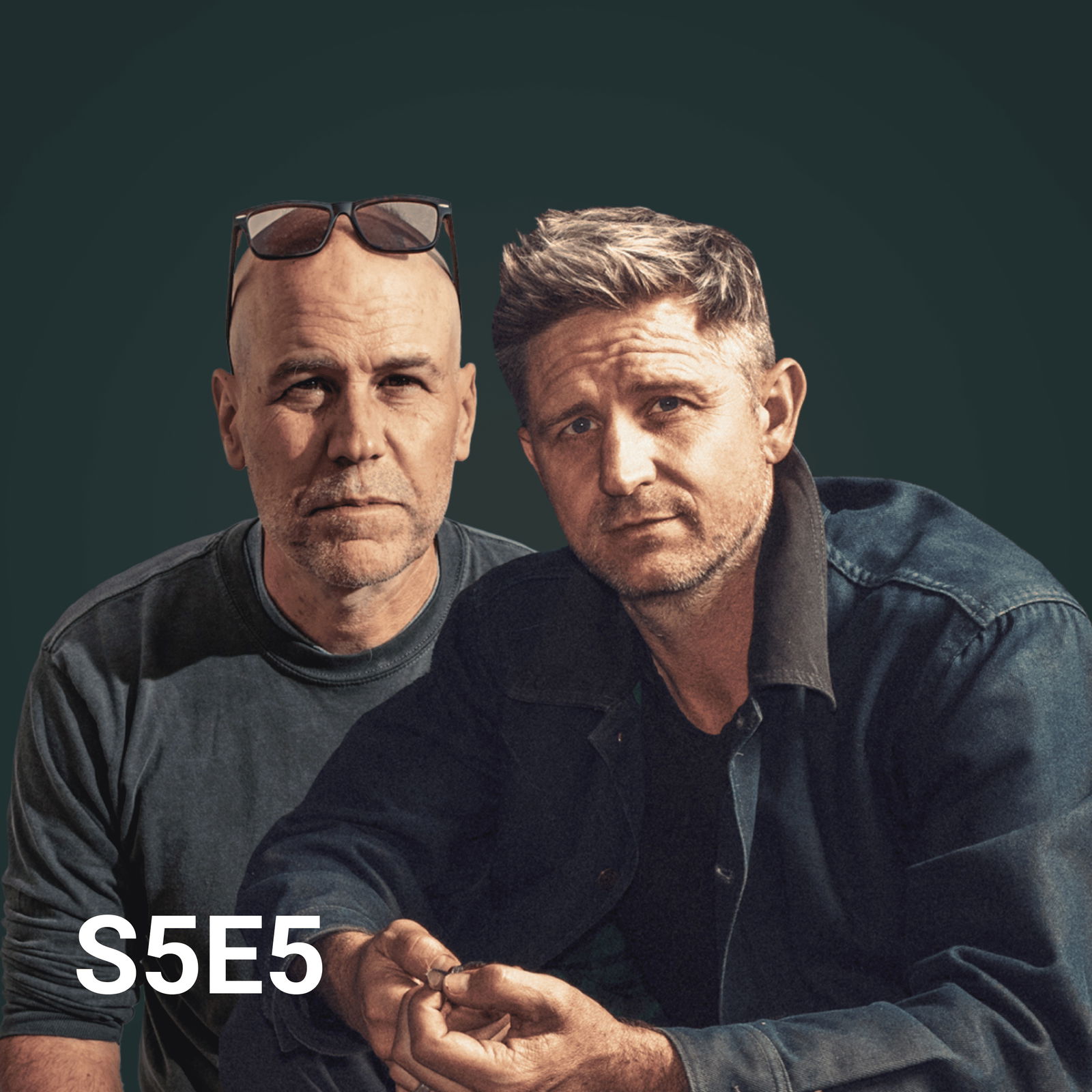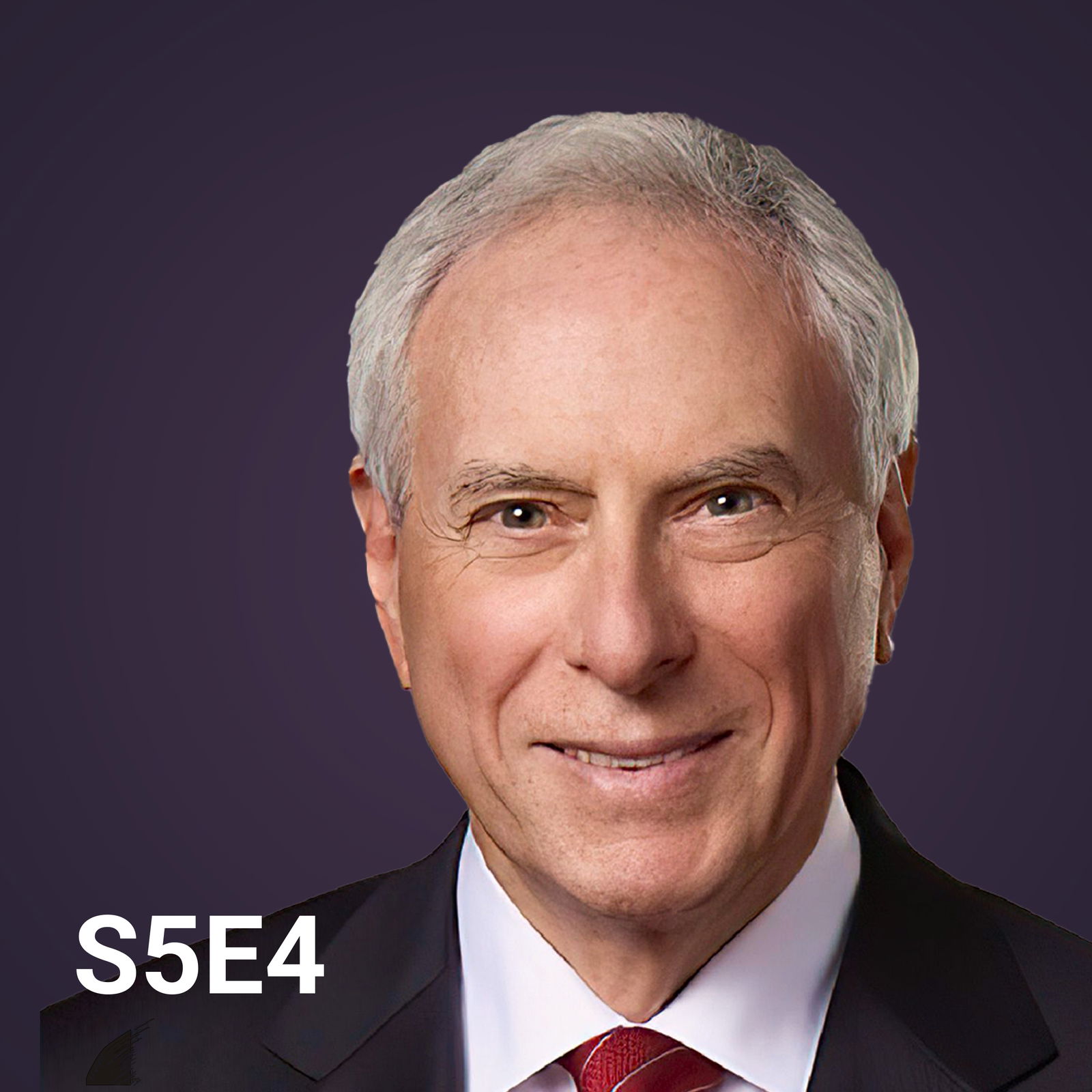Discover Invisible Machines podcast by UX Magazine
Invisible Machines podcast by UX Magazine

Invisible Machines podcast by UX Magazine
Author: Invisible Machines
Subscribed: 429Played: 868Subscribe
Share
© All rights reserved
Description
"The enemy of nonsense in AI" | The #1 podcast about agentic AI
Join great conversations with experts about the intersections between AI, product design, technology and business.
The bestselling authors of Age Of Invisible Machines are joined by other luminaries to continue the conversations that began in their book—the first bestseller about agentic AI. With a newly revised and updated Second Edition that hit the shelves in spring of 2025, Robb Wilson (CEO and Co-Founder of OneReach.ai) and Josh Tyson expand their explorations of disruptive technology with fellow AI insiders, experts, and luminaries working in adjacent realms.
Join great conversations with experts about the intersections between AI, product design, technology and business.
The bestselling authors of Age Of Invisible Machines are joined by other luminaries to continue the conversations that began in their book—the first bestseller about agentic AI. With a newly revised and updated Second Edition that hit the shelves in spring of 2025, Robb Wilson (CEO and Co-Founder of OneReach.ai) and Josh Tyson expand their explorations of disruptive technology with fellow AI insiders, experts, and luminaries working in adjacent realms.
102 Episodes
Reverse
Brian Solis, is a digital anthropologist and futurist who serves as the Head of Global Innovation at ServiceNow and is the former Head of Global Innovation at Salesforce. Brian is a bestselling author of Lifescale, The End of Business as We Know It, and Mindshift, which helps leaders learn how to see emerging trends, harness disruptive forces, and use them to fuel growth. Brian joins Robb and Josh to talk with us about the importance of self-disruption in AI adoption. With so many genAI projects failing to reach production, this episode looks at approaches taken by IKEA and Airbnb that have induced the kind of mind shift that invites self-disruption. Brian, who's been called the CEO whisperer, also talks about the nuanced difference between “aha” and “uh-oh” moments and the pitfalls of hopeless optimism.Brian Solis’s works: https://briansolis.com/books/Key Chapters0:00 — Intro: Josh & Rob set the stage0:34 — Guest intro: Brian Solis (ServiceNow futurist, author of Mindshift)1:07 — Why AI adoption requires self-disruption1:26 — Aha vs Uh-oh moments with AI5:30 — Why Brian is called the “CEO Whisperer”8:30 — Rethinking failure & success (beyond SV mantras)12:11 — Storytelling as strategy: Disney & Airbnb lessons21:40 — MindShift: disruption as a deliberate choice23:10 — Embrace complexity (the VC decision lens)25:10 — Iteration vs innovation: redefining growth29:00 — ROI vs “Return on Ignorance” (cost of not acting)34:01 — Multiple futures & scenario planning39:08 — Organizational AGI: companies as futurists43:28 — IKEA case study: automation + augmentation46:12 — NVIDIA & the power of simulations---------- Support our show by supporting our sponsors!This episode is supported through partnership with OneReach.ai. Experience the runtime for AI agents — a turnkey private architecture and tools for building enterprise-grade agentic solutions. Use any AI modelsCreate guardrails for organizational alignmentEquipped with enterprise grade security Avoid vendor lock-in.OneReach.ai’s award-winning AI agent orchestration platform meets the many requirements for seizing powerful new technologies in this pivotal moment.Interested in implementing an Agent Platform for your organization? Book a Demo: https://onereach.ai/book-a-demo/?utm_source=soundcloud&utm_medium=social&utm_campaign=podcast_s6e6&utm_content=1 --------------------> The revised and significantly updated second edition of our bestselling book about successful adoption of AI agents, Age of Invisible Machines, is now available anywhere you buy your books:Amazon — https://bit.ly/4hwX0a5#InvisibleMachines #Podcast #TechPodcast#AI #AgenticAI#AIPodcast#DigitalTransformation#AIDisruption #AIAdoption#FutureOfWork #DigitalTransformation #InnovationLeadership #AIInBusiness#BusinessInnovation
As Global Head of AI at PayPal, Prakhar Mehrotra is looking deeply at the ways agentic AI is affecting commerce — particularly timely given PayPal and Google’s recent announcement of a multiyear strategic partnership to advance various commerce solutions. He joins Josh and Robb for a layered conversation that speculates on the shape of future marketplaces, where machines are bidding and setting prices on behalf of individuals and businesses. The trio also discuss the ways that AI is reworking the plumbing of technology within organizations and how agent runtime environments hold the key to successful adoption of AI. As the world evolves into one with more AI agents than websites, digital interactions might become simplified for users in ways that add complexity for businesses. Prakahr shares his insights into how humans might interact with technology in the future and how technology will change commerce in ways that are hard to fathom but crucial to confront.---------- Support our show by supporting our sponsors!This episode is supported through partnership with OneReach.ai. Experience the runtime for AI agents — a turnkey private architecture and tools for building enterprise-grade agentic solutions. Use any AI modelsCreate guardrails for organizational alignmentEquipped with enterprise grade security Avoid vendor lock-inOneReach.ai’s award-winning AI agent orchestration platform meets the many requirements for seizing powerful new technologies in this pivotal moment.Interested in implementing an Agent Platform for your organization? Book a Demo: https://onereach.ai/book-a-demo/?utm_source=soundcloud&utm_medium=social&utm_campaign=podcast_s6e5&utm_content=1 --------------------> The revised and significantly updated second edition of our bestselling book about successful adoption of AI agents, Age of Invisible Machines, is now available anywhere you buy your books: Amazon — https://bit.ly/4hwX0a5 Chapters -0:00 — Intro & guest: Prakhar Mehrotra, PayPal1:46 — Galaxy Quest, aliens & how LLMs “learn”3:46 — When AI gets a wallet: true agency begins6:42 — Marketing to humans vs marketing to AIs8:19 — From the information age to the intelligence age10:25 — Decision hierarchies: bots, assistants & concierge agents13:05 — Hyper-personalized pricing in the LLM era17:20 — Merchants vs consumers: who wins when agents decide19:09 — Human vs tech today, AI vs AI tomorrow (electricity wars)25:11 — Marketplaces where agents set prices (the PayPal angle)51:41 — Identity, fraud & trust: why payments need a gatekeeper54:27 — Micropayments & sub-penny agent-to-agent economies1:02:04 — PayPal as the “clearing house” of agentic commerce1:17:16 — Closing thoughts & outro#InvisibleMachines #Podcast #TechPodcast#AI #AgenticAI#AIPodcast#DigitalTransformation#AIFirst#AIAdoption#TechLeadership#Commerce#PayPal#Innovation
Cassie Kozyrkov returns for a deep dive into the decision science behind a truly AI-first approach to technology adoption. Cassie was Google’s first Chief Decision Scientist and currently advises world leaders and executives on how to optimize their most critical decisions. In this episode she explains why AI is now our memory prosthesis and offers sage guidance on how individuals and organizations can become AI-first. This includes an urgent warning to business leaders to avoid the low-hanging fruit of using AI to automate processes there are already clear instructions for. Instead, Cassie explains how to begin looking in the attic and targeting the stuff that always seemed impossible to automate.Introduction to neural networks and deep learning (by Cassie) - https://bit.ly/mfml_113Cassie also offers courses on Maven, including one with Pascal BORNET and Brian Evergreen (Agentic Artificial Intelligence for Leaders) - the next cohort is Sept 8-19, 2025: https://maven.com/the-future-solving-company/agentic-intelligence-for-leaders---------- Support our show by supporting our sponsors!This episode is supported through partnership with OneReach.ai. Experience the runtime for AI agents — a turnkey private architecture and tools for building enterprise-grade agentic solutions. Use any AI modelsCreate guardrails for organizational alignmentEquipped with enterprise grade security Avoid vendor lock-inOneReach.ai’s award-winning AI agent orchestration platform meets the many requirements for seizing powerful new technologies in this pivotal moment.Interested in implementing an Agent Platform for your organization? Book a Demo: https://onereach.ai/book-a-demo/?utm_source=soundcloud&utm_medium=social&utm_campaign=podcast_s6e4&utm_content=1 --------------------> The revised and significantly updated second edition of our bestselling book about successful adoption of AI agents, Age of Invisible Machines, is now available anywhere you buy your books: Amazon — https://bit.ly/4hwX0a5 #InvisibleMachines #Podcast #TechPodcast#AI #AgenticAI#AIPodcast#DigitalTransformation#DecisionScience#AIFirst#AIAdoption#TechLeadership#FutureofWork#EnterpriseAI#AIAgents#TechTrends#google
Bryan Catanzaro was instrumental in the adoption of GPUs for powering machine learning, which has effectively turned NVIDIA from a graphics processing hardware company into a $4T AI powerhouse. Bryan joins Robb and Josh to talk about his journey in AI and how the unique psychology and power structures at NVIDIA enables the company to continually meet the moment in surprising ways. They also discuss the impact of Bryan’s plea for help in categorizing data for emerging language models at a 2019 keynote he delivered to librarians at Stanford. Perhaps most importantly, Bryan shares thoughts on how hair was the first technology. ---------- Support our show by supporting our sponsors!This episode is supported through partnership with OneReach.ai. Experience the runtime for AI agents — a turnkey private architecture and tools for building enterprise-grade agentic solutions. Use any AI modelsCreate guardrails for organizational alignmentEquipped with enterprise grade security Avoid vendor lock-inOneReach.ai’s award-winning AI agent orchestration platform meets the many requirements for seizing powerful new technologies in this pivotal moment.Interested in implementing an Agent Platform for your organization? Book a Demo: https://onereach.ai/book-a-demo/?utm_source=soundcloud&utm_medium=social&utm_campaign=s6e3&utm_content=1 ------------------ The revised and significantly updated second edition of our bestselling book about successful adoption of AI agents, Age of Invisible Machines, is now available anywhere you buy your books: Amazon - https://bit.ly/4hwX0a5 #InvisibleMachines #Podcast #TechPodcast#AI #AgenticAI#AIPodcast#DigitalTransformation #Coding#TechTrends#EnterpriseAI#GPUs #NVIDIA #AIInnovation #DataScience #LanguageModels #TechLeadership#CUDA
In her instant New York Times bestseller, Empire of AI, journalist Karen Hao distills more than a decade of in-depth research into a detailed account of OpenAI’s rise to power and why leadership at the company abandoned their promise to keep their research open. Karen joins Robb and Josh for a deep dive into murkiness surrounding what artificial general intelligence (AGI) actually represents and why AI colonialism and biased systems undercut efforts to create superintelligence that represents the vastness of human learning and experience. Drawing on the work of a nonprofit in New Zealand to preserve the Māori language, the trio also discuss why smaller, focused implementations that use better curated data might be more valuable to businesses trying to integrate AI into their operations.Buy Karen Hao’s book “Empire of AI: Dreams and Nightmares in Sam Altman's OpenAI”: https://www.penguinrandomhouse.com/books/743569/empire-of-ai-by-karen-hao/Learn more about Karen and here work: https://karendhao.com/---------- Support our show by supporting our sponsors!This episode is supported through partnership with OneReach.ai. Experience the runtime for AI agents — a turnkey private architecture and tools for building enterprise AI agents with guardrails. Use any AI modelsWith enterprise grade security And avoid vendor lock-in.OneReach.ai’s award-winning AI agent orchestration platform meets the many requirements for seizing powerful new technologies in this pivotal moment.Learn more at onereach.ai/ai-agents.—---------The revised and second edition of our bestselling book, Age of Invisible Machines, is available now on Amazon! https://a.co/d/axLFOhX Episode Credits:Robb Wilson — Resident expertJosh Tyson — Co-hostVishal Menon — ProducerMykhailo Lytvynov — Audio/Video Editor & Sound EngineerDaryna Moskovchuk — Graphic DesignAlla Slesarenko — Copy Vira Prykhodko — Web Development Elias Parker — Executive Producer#InvisibleMachines #Podcast #TechPodcast#AI #AgenticAI#AIPodcast#KarenHao#OpenAI#AGI#OAGI#EmpireOfAI#AIColonialism#Anthropomorphism#FutureOfAI
Award-winning journalist Stephen Witt sits down with Josh and Robb to share insights from his latest book, The Thinking Machine: Jensen Huang, Nvidia, and the World's Most Coveted Microchip. There’s a deep connection between Nvidia’s GPU chips and the neural networks powering the LLMs at the center of agentic AI. Witt’s book provides a captivating biography of Huang that details his radical approach to business and innovation, which has made Nvidia the most valuable company in the world (recently reaching a record-breaking market cap of $4 trillion). This episode explores this history of AI as well as the coming Omniverse and what the power of simulation will mean to businesses.Buy Stephen Witt’s book! The Thinking Machine: Jensen Huang, Nvidia, and the World's Most Coveted Microchip---------- Support our show by supporting our sponsors!This episode is supported through partnership with OneReach.ai Experience the runtime for AI agents - a turnkey private architecture and tools for building enterprise AI agents with guardrails. Use any AI modelsWith enterprise grade security And avoid vendor lock-in.OneReach.ai’s award-winning AI agent orchestration platform meets the many requirements for seizing powerful new technologies in this pivotal moment.Learn more at onereach.ai/ai-agents.------------------------------------------------------------The revised and second edition of our bestselling book, Age of Invisible Machines, is available now wherever you buy books! Amazon: https://a.co/d/axLFOhXEpisode CreditsRobb WilsonJosh TysonVishal Menon - ProducerMykhailo Lytvynov - Audio/Video Editor & Sound EngineerDaryna Moskovchuk - Graphic DesignAlla Slesarenko - Copy Vira Prykhodko - Web Development Elias Parker - Executive Producer#InvisibleMachines #Podcast #TechPodcast#AI #AgenticAI#AIPodcast#Nvidia#TechTrends#EnterpriseAI#TheThinkingMachine#FutureofWork#TechBooks#Business#Innovation#simulation#omniverse#jensenhuang
Product design sage Tim Wood returns to the podcast for a conversation about the deepening integrations between experience design and AI, including a dissection of the trending term “vibe coding.” Currently a design lead at Meta, Tim has hands-on experience leading AI-first design and this episode explores what that means on a tactical level. Having been the Principal Product Designer for AI Platforms at AWS, and Head of Design for Amazon Q Developer, Tim shares hot takes with Robb and Josh on what automated mainframe migration means for SaaS providers as well as the broader business community, which leads to the real-time birth of another new term: “placebo swipes.” ---------- Support our show by supporting our sponsors!This episode is brought to you in partnership with OneReach.ai — offering turnkey private architecture for building and orchestrating your team’s AI agents with guardrails.Use any AI modelsTrusted enterprise-grade securityNo vendor lock-inDiscover more about the power of orchestrating agentic AI: https://bit.ly/4jBfVRt --------------------- Our new book is out NOW! The revised and significantly updated second edition of our bestselling book about how teams can successfully orchestrate AI agents, Age of Invisible Machines, is now available everywhere! https://a.co/d/im5rb8F#InvisibleMachines #Podcast #TechPodcast#AI #AgenticAI#AIPodcast#UXDesign #ExperienceDesign #AIDesign #UserExperience #AIAntegration #SaaS#DigitalTransformation #Coding#VibeCoding#TechTrends#EnterpriseAI#aiagents #aibooks #bestsellingbooks #aws #meta
What is the explosion of AI solutions in the marketplace doing to pillars of experience design? On this Ask Us Anything episode of Invisible Machines, Robb and Josh respond to a question from Dr. Irina Wagner, listener who works as a generative AI UX researcher at a massive US healthcare company. The answer to her question has connections to Robb’s time working in the sound department at Warner Bros., on films ranging from Galaxy Quest to The Thin Red Line. At its core, success in UX comes down to storytelling. People love stories—give them a compelling one, and they will follow you. As adoption increases, AI is likely to expose bad design by putting a premium on effective storytelling and good taste. This episode takes a deeper look at these elements, offering a fresh perspective and some hard truths about technology and design.---------- Support our show by supporting our sponsors!This episode is brought to you in partnership with OneReach.ai—offering turnkey private architecture for building your team’s AI agents with guardrails.Use any AI modelsTrusted enterprise-grade securityNo vendor lock-inDiscover more about AI agents and how your team can build and scale them: https://bit.ly/3DCxgu8 --------------------- Our new book is on it's way! The revised and significantly updated second edition of our bestselling book about successful adoption of AI agents, Age of Invisible Machines, is now available for preorder on Amazon: https://bit.ly/4hwX0a5 #InvisibleMachines #Podcast #TechPodcast#AI #AIPodcast#UXDesign #ExperienceDesign #Storytelling #AIDesign #UserExperience #HumanCenteredDesign #TechInnovation #DesignThinking #DigitalTransformation #FutureOfAI #MachineLearning #ProductDesign #CreativeTechnology
As NASA’s longest-running Chief Administrator, Dan Goldin ushered in an era of “faster, better, cheaper” that prioritized safety while pushing the organization forward. He joins Robb and Josh to discuss his approach to innovation and kick some holes in fallacies like the iron triangle, which he calls “horsepuckey.” Goldin was at the helm of major projects, including a redesign of the International Space Station, and various Mars exploration programs. Robb and Josh dig into his profound 50/50 rule for finding team members who can move the needle on innovation without holding an organization back, which has a surprising connection to the work of Michaelangelo. In this episode:The 2nd edition of Robb and Josh’s bestselling book, Age of Invisible Machines: A Guide to Orchestrating AI Agents and Making Organizations More Self-Driving: http://bit.ly/4b7Rx7d Michelangelo’s sculptures: https://www.michelangelo.net/sculptures/ Ben R. Rich's book, Skunk Works: A Personal Memoir of My Years at Lockheed: https://www.amazon.com/Skunk-Works-Personal-Memoir-Lockheed/dp/0316743003Big Hairy Audacious Goals (BHAG): https://www.investopedia.com/terms/b/big-hairy-audacious-goal-bhag.asp The North American Free Trade Agreement (NAFTA): https://en.wikipedia.org/wiki/North_American_Free_Trade_AgreementWorld Trade Organization: https://www.wto.org/Czinger, an American automobile manufacturer of hybrid sports cars: https://www.czinger.com/BRIDGE Bike Works, a full cycle manufacturer of carbon fiber bicycles, designed and manufactured entirely in Toronto, Canada: https://www.bridgebikeworks.com/The Invisible Machines episode, "S4E9 Digital Twins in an Agentic World” with Dr. Michael Grieves: https://youtu.be/KsL3w2bVjmw?si=KtKRxw9d_ofszFRs Learn more about Dan Goldin, his initiatives, blog and speaking engagements - and do follow him on Linkedin - he’s got a lot of wisdom as is great at sharing it:https://www.danielsgoldin.com/The revised and significantly updated second edition of our bestselling book, Age of Invisible Machines, is now available for preorder on Amazon: https://bit.ly/4hwX0a5 Support our show by supporting our sponsors!This episode is brought to you in partnership with OneReach.ai—offering turnkey private architecture for building your team’s AI agents with guardrails.Any AI modelsEnterprise-grade securityNo vendor lock-inDiscover more about the power of agentic AI: https://onereach.ai/ai-agents/?utm_source=soundcloud&utm_medium=social&utm_campaign=podcast_episode_with_dan_goldin&utm_content=1 #TechPodcast#NASA#DanGoldin#Innovation#Leadership #SpaceExploration#Aerospace#TechLeadership#TalentStrategy#STEM#AIPodcast#TechPodcast#InvisibleMachines#ArtificialIntelligence#AIAgents#AgenticAI#TechInnovation
Did the US Copyright office just declare that AI is the artist, not the tool?Does their new report raise more questions than it answers? Robb and Josh welcome back Ed Klaris, Managing Partner at Klaris Law and Columbia Law professor, for part two of their discussion on the office’s ongoing Copyright and Artificial Intelligence report, focusing on copyrightability.Klaris returns with critical insights into what these updates to copyright law mean with more and more people now using generative AI as part of their creative process. The report sets some useful guidelines for which aspects of AI-assisted creative projects are copyrightable, yet it also sparks new questions about the boundaries between human and machine-generated output.Find out more about Ed Klaris and his work here: https://www.klarislaw.comThe revised and significantly updated second edition of our bestselling book, Age of Invisible Machines, is now available for preorder on Amazon! https://bit.ly/4hwX0a5 In this episode, we mention:US Copyright Office’s report on Copyright and Artificial Intelligence (Part 1: Digital Replicas and Part 2: Copyrightability): https://www.copyright.gov/ai/An AI-Generated Picture Won an Art Prize: https://www.nytimes.com/2022/09/02/technology/ai-artificial-intelligence-artists.htmlDeepSeek, a Chinese artificial intelligence software company: https://www.deepseek.com/What Air Canada Lost In ‘Remarkable’ Lying AI Chatbot Case: https://www.forbes.com/sites/marisagarcia/2024/02/19/what-air-canada-lost-in-remarkable-lying-ai-chatbot-case/Cursor, an AI code editor: https://www.cursor.com/The Invisible Machines episode, "S4E13 Are generative AI tools unlawful to use?”: S4E13 Are generative AI tools unlawful to use? --------------------------------------------------------------------Support our show by supporting our sponsors!This episode is brought to you in partnership with OneReach.ai—offering turnkey private architecture for building your team’s AI agents with guardrails.Any AI modelsEnterprise-grade securityNo vendor lock-inLearn about creating and orchestrating AI agents for your team:https://onereach.ai/ai-agents/?utm_source=soundcloud&utm_medium=social&utm_campaign=podcast_episode_with_ed_klaris_2&utm_content=1 #AI#AIPodcast#TechPodcast#InvisibleMachines#ArtificialIntelligence#AIAgents#AgenticAI#TechInnovation#GenerativeAI#CopyrightLaw #AILaw#IntellectualProperty#AICopyright#LegalTech#DigitalRights#TechLaw
Blaise Agüera y Arcas, author and CTO of Technology & Society at Google, returns to the podcast to talk about his new work, What is Life?. This limited-edition, pocket-sized book is the first part of a larger print project with MIT Press and Antikythera titled What Is Intelligence?. What is Life? draws fascinating parallels between the life-building chemical reactions taking place in natural chimneys deep in our oceans and the work of Alan Turing and John von Neumann in the mid-twentieth century. Blaise joins Robb and Josh to explore how self-reproduction—and thus life—is inherently computational. This conversation delves into the nested nature of life on Earth and how technology is an extension of our evolution.You can buy Blaise’s books from Hat & Beard Press:Who Are We Now? https://hatandbeard.com/products/who-are-we-now-by-blaise-aguera-y-arcas Ubi Sunt https://hatandbeard.com/products/ubi-sunt-by-blaise-aguera-y-arcas In this episode, we mention:Blaise Agüera y Arcas’s work, “What is Life” — read for free online: https://whatisintelligence.antikythera.orgLynn Margulis’s books: https://www.amazon.com/Books-Lynn-Margulis/s?rh=n%3A283155%2Cp_27%3ALynn%2BMargulisConventional evolutionary theory (Neo-Darwinism): https://en.wikipedia.org/wiki/Neo-DarwinismStephen Jay Gould’s books: https://www.amazon.com/Books-Stephen-Jay-Gould/s?rh=n%3A283155%2Cp_27%3AStephen%2BJay%2BGould W. Brian Arthur’s book, “The Nature of Technology: What It Is and How It Evolves”: https://www.amazon.com/Nature-Technology-What-How-Evolves/dp/1416544062The Invisible Machines episode, "Radically Honest AI with Dr. Anna Lembke": S5E01 Radically Honest AI with Dr. Anna LembkeAnna Lemble’s book, “Dopamine Nation: Finding Balance in the Age of Indulgence”: https://www.amazon.com/Dopamine-Nation-Finding-Balance-Indulgence/dp/152474672XRichard S. Sutton and Andrew G. Barto's book, "Reinforcement Learning: second edition: An Introduction (Adaptive Computation and Machine Learning series)" (about temporal difference learning): https://www.amazon.com/Reinforcement-Learning-Introduction-Adaptive-Computation/dp/0262039249/ref=dp_ob_title_bkWolfram Schultz’s work, “Responses of monkey dopamine neurons to reward and conditioned stimuli during successive steps of learning a delayed response task”: https://pubmed.ncbi.nlm.nih.gov/8441015/The direction of time and Boltzmann’s time hypothesis: http://staff.mechmining.uq.edu.au/klimenko/pub/pdf/Phys_Scr_2019.pdfRay Kurzweil's book, "The Singularity Is Near: When Humans Transcend Biology": https://www.amazon.com/Singularity-Near-Humans-Transcend-Biology/dp/0670033847 The story of the Luddites: https://en.wikipedia.org/wiki/LudditeThe Invisible Machines episode, “The Intelligence All Around Us” with James Bridle: S4E4 The Intelligence All Around UsJames Bridle’s' book, “Ways of Being: Animals, Plants, Machines: The Search for a Planetary Intelligence”: https://www.amazon.com/Ways-Being-Machines-Planetary-Intelligence/dp/0374601119 Disney Pixar’s movie, “WALL·E”: https://www.imdb.com/title/tt0910970/Joseph Henrich's book, "The Secret of Our Success: How Culture Is Driving Human Evolution, Domesticating Our Species, and Making Us Smarter": https://www.amazon.com/Secret-Our-Success-Evolution-Domesticating/dp/0691166854 Ethan Mollick's book, "Co-Intelligence: Living and Working with AI": https://www.amazon.com/Co-Intelligence-Living-Working-Ethan-Mollick/dp/059371671X Learn about creating and orchestrating AI agents for your team:https://onereach.ai/ai-agents/?utm_source=soundcloud&utm_medium=social&utm_campaign=podcast_episode_with_blaise_aguera_y_arcas&utm_content=1#AI#AIPodcast#TechPodcast#InvisibleMachines#ArtificialIntelligence#AIAgents#AgenticAI#TechInnovation#WhatIsLife#AIandLife#AIResearch#Intelligence#EvolutionAndTechnology#LifeOnEarth#TechAndSociety
Anna Lembke, MD, author of the New York Times bestseller Dopamine Nation: Finding Balance in the Age of Indulgence, joins Robb and Josh for a discussion about the perils and promise of AI. As a psychiatrist and Chief of the Stanford Addiction Medicine Dual Diagnosis Clinic at Stanford University, Dr. Lembke shares critical insights into the power and nature of behavioral addiction, and how technology and digital media are impacting the dopamine systems in our brains. Drawing from her experience with patients, she shares the concept of radical honesty—a cornerstone of addiction recovery. Together, they explore how radically honest AI could pose less of a threat and help establish healthier boundaries around technology use.In this episode, we mention:Dr. Anna Lemble’s book “Dopamine Nation: Finding Balance in the Age of Indulgence”: https://www.amazon.com/Dopamine-Nation-Finding-Balance-Indulgence/dp/152474672X The forthcoming revised and updated 2nd edition of Robb Willson and Josh Tyson’s bestselling book, “Age of Invisible Machines: A Practical Guide to Creating a Hyperautomated Ecosystem of Intelligent Digital Workers”: https://www.amazon.com/Age-Invisible-Machines-Orchestrating-Organizations/dp/1394321554Dr. Anna Lembke’s “The Official Dopamine Nation Workbook: A Practical Guide to Finding Balance in the Age of Indulgence”: https://www.amazon.com/Official-Dopamine-Nation-Workbook-Indulgence/dp/0593476212?sr=1-1Pew Research Center survey of U.S. teens ages 13 to 17 conducted Sept. 18-Oct.10, 2024: "Teens, Social Media, and Technology 2024": https://www.pewresearch.org/internet/2024/12/12/teens-social-media-and-technology-2024/Learn about creating and orchestrating AI agents for your team:https://onereach.ai/ai-agents/?utm_source=soundcloud&utm_medium=social&utm_campaign=podcast_episode_with_anna_lembke&utm_content=1#AI#AIPodcast#TechPodcast#InvisibleMachines#ArtificialIntelligence#AIAgents#AgenticAI#TechInnovation#DopamineNation#RadicalHonesty#DigitalAddiction#MentalHealth#TechImpact#BehavioralScience#Dopamine#AnnaLembke
Active inference is a “first principles” approach to understanding behavior and the brain, framed in terms of a single imperative to minimize free energy. The free energy principle describes systems that pursue paths of least surprise, minimizing the difference between predictions based on their model of the world and their sense and associated perception. Dr. Thomas Parr is a practicing clinician and prominent researcher in the field of theoretical neuroscience and he currently works as an NIHR Academic Clinical Fellow in Neurology at the University of Oxford’s Nuffield Department of Clinical Neurosciences. He is also a co-author of Active Inference: The Free Energy Principle in Mind, Brain, and Behavior, written in collaboration with Giovanni Pezzulo and Karl J. Friston.In this episode, we mention:Thomas Parr’s book “Active Inference: The Free Energy Principle in Mind, Brain, and Behavior (co-written with Giovanni Pezzulo and Karl J. Friston): https://www.penguinrandomhouse.com/books/704196/active-inference-by-thomas-parr-giovanni-pezzulo-and-karl-j-friston/Troxler's fading: https://en.wikipedia.org/wiki/Troxler%27s_fading The Invisible Machines episode “Digital Natives Are Now AI Immigrants” with Marc Prensky: https://youtu.be/CAKumte_JP8?si=OxPKZbRKIegEjBvh Landauer's principle: https://en.wikipedia.org/wiki/Landauer%27s_principle Learn about orchestrating AI agents for your team:https://onereach.ai/ai-agents/?utm_source=soundcloud&utm_medium=social&utm_campaign=podcast_episode_with_thomas_parr&utm_content=1#aipodcast#techpodcast#invisiblemachines#ai#artificialintelligence#aiagents#agenticai#techinnovation#neuroscience#activeinference#machinelearning#congitivescience#behavioralscience#futureofai#neuroai#thinkingmachines
Despite being a massive piece of the bigger AI puzzle, computer vision doesn’t always get the recognition it deserves. Robb and Josh welcome Dr. Jason Corso, Professor of Robotics at University of Michigan for an In Action episode that explores the complexity and power of machines that can see. Jason is the Co-Founder and Chief Science Officer of Voxel51, which is backed by Bessemer Venture Partners, and in this episode he demonstrates open-source tools available for working with massive datasets that include images and videos. The trio also discuss the border implication of adding the context that vision can afford to multi-agent systems.Explore Dr. Jason Corso’s Voxel51 platform: https://voxel51.com/ FiftyOne Open Source: Voxel51's open source toolkit for building high-quality datasets and computer vision models.FiftyOne Teams: Voxel51’s commercial offering based on open source FiftyOne.People can try FiftyOne at try.fiftyone.ai. Voxel51 on Github: https://github.com/voxel51/fiftyoneA course on Coursera that Voxel51 created called "Hands-on Data Centric Visual AI" — https://www.coursera.org/learn/hands-on-data-centric-visual-aiLearn about orchestrating AI agents for your team:AI agent landing page with the whitepaper: https://onereach.ai/ai-agents/?utm_source=soundcloud+&utm_medium=social&utm_campaign=computer_vision_in_action_episode&utm_content=1 Learn about the only tools for orchestrating AI agents that are named a leader by all major analyst firmsAI agent landing page (dev): https://aiagents.onereach.ai/?utm_source=soundcloud&utm_medium=social&utm_campaign=computer_vision_in_action_episode&utm_content=1 #AIPodcast#TechPodcast#InvisibleMachines#AI #ArtificialIntelligence#AIAgents#AgenticAI#ComputerVision#MultiAgentSystems#DataScience#TechInnovation#AIinAction#GenerativeAI#NoCode#Automation #DigitalTransformation#AITech
What’s it like to build an AI agent? Daniel Lametti, Associate Professor of Psycholinguistics at Acadia University, Visiting Fellow at the University of Oxford, and Senior Academic Advisor to OneReach.ai, returns to Invisible Machines to demonstrate how easy it can be to create and iterate on AI agents.Like other In Action episodes, you’ll watch as we walk through the practical realities of building these systems. This time, see how professor Daniel Lametti creates an objective-based AI agent that helps users craft and send emails. Though he’s hesitant to think of himself as one, conversational technologies have made Daniel a deft software developer. In this In Action episode, Daniel shares his experiences building AI agents with Robb and Josh. The trio discuss and show how coding languages are moving further into the background as machines become more adept at communicating in human language.Follow Daniel Lametti’s work: https://psychology.acadiau.ca/daniel-lametti.htmlLearn about orchestrating AI agents for your team:https://onereach.ai/ai-agents/?utm_source=soundcloud&utm_medium=social&utm_campaign=email_agents_in_action_episode&utm_content=1 #AIPodcast#TechPodcast#InvisibleMachines#AI #ArtificialIntelligence#AIAgents#AgenticAI#GenerativeAI#LLMs#ConversationalAI#InAction#NoCode#Automation #DigitalTransformation#NaturalLangiageProcessing#Email#SoftwareDevelopment#FutureofAI#UXDesign#MachineLearning#AITech
Robb and Josh are joined by Ed Klaris, Managing Partner at Klaris Law, Columbia Law professor, and CEO of KlarisIP, for a conversation about the fate of generative tools like LLMs and AI models that produce audio and video. From Ed’s viewpoint, giant tech companies used stolen content to train the powerful AI models that have quickly changed the world around us.
The trio discuss the question of whether or not it’s lawful for us all to use generative AI tools and how IP and copyright law will impact, and be impacted by generative AI. As we wait for landmark decisions that will determine the fate of these tools, this conversation with Ed Klaris offers context and food for thought, and for some maybe even a sense of alarm.
In this episode, we mention:
The US Copyright Office: https://copyright.gov/
The Statute of Anne, also known as the Copyright Act 1710: https://en.wikipedia.org/wiki/Statute_of_Anne
Google Books copyright case: https://en.wikipedia.org/wiki/Authors_Guild,_Inc._v._Google,_Inc.
AIr Canada AI chatbot case: https://www.forbes.com/sites/marisagarcia/2024/02/19/what-air-canada-lost-in-remarkable-lying-ai-chatbot-case/
Follow Ed Klaris's work: https://www.klarislaw.com/
Learn about orchestrating AI agents for your team:
https://onereach.ai/ai-agents/?utm_source=soundcloud&utm_medium=social&utm_campaign=copyright_law_episode&utm_content=1
#AIPodcast
#TechPodcast
#InvisibleMachines
#AI
#ArtificialIntelligence
#AIAgents
#AgenticAI
#GenerativeAI
#LLMs
#IntellectualProperty
#CopyrightLaw
#AIEthics
#TechLaw
#AIRegulation
#DigitalTransformation
#Innovation
#FutureofAI
#AIandIP
#LegalTech
#AITransparency
Jieun Kiaer is the Professor of Korean Linguistics at Oxford and her new book, The Future of Syntax: Asian Perspectives in an AI Age, explores the complexity within Chinese, Japanese, and Korean languages, arriving at insights that veer away from traditional approaches to formal syntax. The book also revisits Marc Prensky’s “digital native” concept, laying the groundwork for a new generation of technology users, “AI natives.”
Jieun joins Robb and Josh for a conversation about the promise and peril of radical new technologies in classroom settings and how we might shift our focus to designing a positive future for AI natives.
In this episode, we mention:
Jieun Kiaer’s book “The Future of Syntax: Asian Perspectives in an AI Age”: https://www.bloomsbury.com/us/future-of-syntax-9781350258273/
Follow Jieun Kiaer’s work: https://www.ames.ox.ac.uk/people/jieun-kiaer
Learn about orchestrating AI agents for your team:
https://onereach.ai/ai-agents/?utm_source=soundcloud&utm_medium=social&utm_campaign=future_for_ai_natives_episode&utm_content=1
#AIPodcast
#TechPodcast
#InvisibleMachines
#AI
#ArtificialIntelligence
#AIAgents
#DigitalTransformation
#Innovation
#AIInEducation
#DigitalNatives
#AINatives
#FutureOfLearning
#TechnologyInClassrooms
#AIandEducation
#AsianLanguages
#Linguistics
#TechnologyInEducation
#LanguageLearning
##JieunKiaer
Marc Prensky is widely known for coining the terms “digital native” and “digital immigrant”—both now in the Oxford English Dictionary. In this episode, Marc joins Josh for a conversation about the shortcomings of our current education system and how AI might help inspire and enable a new generation of "AI natives" to design their own future.
The two discuss the challenges that companies face in adjusting to this new technology paradigm, as well as the potential benefits and risks that conversant machines bring to society.
As an eternal optimist, Marc shares his vision of how young people in the third millennium might view productivity and purpose. Marc and Josh also debate the role smartphones play in the classroom of the future, and agree that the world needs more love, empathy, gratitude, and optimism.
In this episode, we mention:
Marc Prensky’s book “Third Millennium Kids: A Hell Yes! Low Stress Guide For Everyone”: https://www.amazon.com/Third-Millennium-Kids-Stress-Everyone/dp/B0DC3J8XV6
Learn more about Marc Prensky: marcprensky.com
Learn about orchestrating AI agents for your team:
SoundCloud:
https://onereach.ai/ai-agents/?utm_source=soundcloud&utm_medium=social&utm_campaign=digital_natives_episode&utm_content=1
YouTube:
https://onereach.ai/ai-agents/?utm_source=youtube&utm_medium=social&utm_campaign=digital_natives_episode&utm_content=1
#AIPodcast
#TechPodcast
#InvisibleMachines
#AI
#ArtificialIntelligence
#ConversationalAI
#AIAgents
#TechInsights
#DigitalTransformation
#TechTalk
#Innovation
#DigitalNatives
#AIInEducation
#FutureOfLearning
#TechnologyInClassrooms
#MarcPrensky
#AINatives
With consumer use of AI technology outpacing enterprise adoption, the fear of companies using AI to get rid of employees has been flipped on its head into legitimate threat to the existence of companies as we know them. There’s nothing preventing consumers from using generative tools to disrupt large companies—for example, using a fleet of AI agents to flood and debilitate a call center to take advantage of a promotion.
Harsha Gowda and Nitin Bhudia, respectively the CTO and Director of Innovation at Getronics, join Robb and Josh to discuss the risk organizations take by dragging their feet in the race for AI adoption. This conversation explores how organizations can embrace “artificial incompetence” as a necessary initial phase on the course to artificial intelligence, and seed the velocity that will transform their operations. By using AI agents to create an abstraction layer over existing solutions, organizations can take control of their futures.
In this episode, we mention:
The Invisible Machines episode “Digital Twins in an Agentic World” with Dr. Michael Grieves, the father of Digital Twins: https://www.youtube.com/watch?v=KsL3w2bVjmw
The TV series “Fawlty Towers”: https://www.imdb.com/title/tt0072500/
Learn more about Getronics: https://www.getronics.com/
Discover how to succeed with an agentic approach to software:
https://onereach.ai/ai-agents/?utm_source=soundcloud&utm_medium=social&utm_campaign=ai_and_companies_episode&utm_content=1
#AIPodcast
#TechPodcast
#InvisibleMachines
#AI
#ArtificialIntelligence
#ConversationalAI
#AIAgents
#TechInsights
#DigitalTransformation
#TechTalk
#Innovation
#GenerativeAI
#BusinessStrategy
#AIAdoption
#OrganizationalAGI
Digital twins are critical to the orchestration of AI agents, providing the context they need to create meaningful experiences quickly and efficiently. Robb and Josh welcome Dr. Michael Grieves for a conversation about the origins of the concept, which he developed while working with NASA in the 2010s.
The architecture required for orchestrating AI agents relies on different types of digital twins that may emerge within an organization, touching on physical elements, temporal data, and collections of unstructured data. Dr. Grieves joins the podcast to explore these connections, drawing from his book Product Lifecycle Management as well as his numerous scientific publications.
The trio also discusses how something Michael calls “retirementitus” prevents organizations from embracing the sweeping technologies surrounding AI and digital twins.
In this episode, we mention:
Dr. Michael Grieves’ book “Product Lifecycle Management: Driving the Next Generation of Lean Thinking”: https://www.amazon.com/Product-Lifecycle-Management-Generation-Thinking/dp/0071452303
Dr. Michael Grieves’ book “Digital Twins, Simulation, and the Metaverse: Driving Efficiency and Effectiveness in the Physical World through Simulation in the Virtual Worlds (Simulation Foundations, Methods and Applications): https://www.amazon.com/Digital-Twins-Simulation-Metaverse-Effectiveness/dp/3031691067
The Invisible Machines episode “Building an Advanced Digital Assistant” with Jeff McMillan (Head of AI) and David Wu (Head of Knowledge Management & Generative AI) at Morgan Stanley: https://www.youtube.com/watch?v=3iQbufK1luE&t=1567s
Charles Perrow’s book “Normal Accidents: Living with High Risk Technologies: https://www.perlego.com/book/735258/normal-accidents-living-with-high-risk-technologies-updated-edition-pdf
The Invisible Machines episode with Dr. Nathan Price, Chief Scientific Officer of Thorn HealthTech, and Dr. Lee Hood, a world-renowned scientist, a recipient of the National Medal of Science, and a key contributor to the human genome project: https://www.youtube.com/watch?v=rrrEu5TNqFg
The Invisible Machines episode “Lean Knowledge Management” with Roger Forsgren, former Chief Knowledge Officer at NASA: https://www.youtube.com/watch?v=e4A_JiBRCr8
You can learn more about orchestrating AI agents for your team: https://onereach.ai/ai-agents/?utm_source=soundcloud&utm_medium=social&utm_campaign=digital_twins_episode&utm_content=1
#AIPodcast
#TechPodcast
#InvisibleMachines
#AI
#ArtificialIntelligence
#ConversationalAI
#AIAgents
#TechInsights
#DigitalTwins
#AIOrchestration
#ProductManagement
#TechInnovation
#DataArchitecture
#MichaelGrieves
#FutureOfAI
#TechTalk
























❤️💌👏